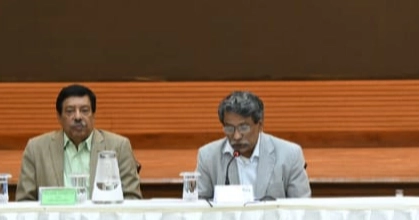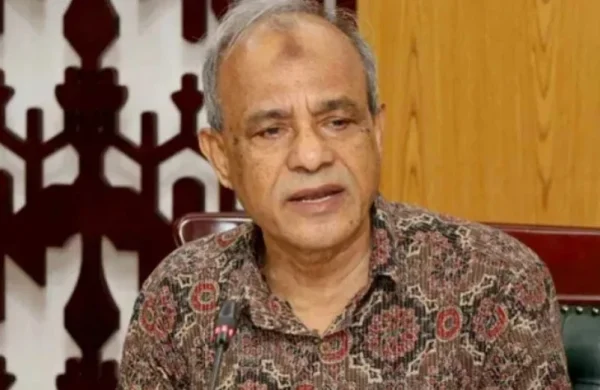Why Govt stepping back from probable mega projects?
- Update Time : Monday, May 13, 2024

TDS Desk:
Bangladesh Railways spent Tk 110 crore on its feasibility study as part of its plans to build a high-speed railway between Dhaka and Chattogram with an estimated construction cost of $1,400 crore or Tk 133,258 crore (as per yesterday’s exchange rate).
Although, the survey was conducted seven years ago, now the officials of the Ministry of Railways are saying that “the project will not be implemented for the time being”.
Construction of Circular Railway in Dhaka, was another project of Bangladesh Railway. The agency adopted this project of about Tk 97,000 crores. Bangladesh Bridge Authority (BBA), on the other hand, has adopted a “go slow” policy in the Dhaka Subway construction project worth Tk 871,273 crores. Recently Bangladesh Railway has also suspended a project of construction of Dhaka-Laksam Cord Line Railway worth Tk 61,738 crore.
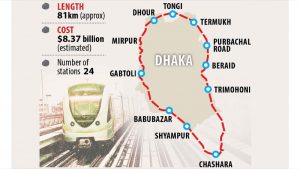
Even after completing the survey, the Government is withdrawing from many possible big projects in the country’s communication infrastructure sector. It is said that these projects will be “implemented later”.
The current economic situation is also being discussed as a reason for withdrawing from big projects, despite a huge amount of money has already been spent on surveying the projects. Communication infrastructure experts see this amount as a “waste”.
In this regard, Professor Dr. Hadiuzzaman of the Civil Engineering Department at Bangladesh University of Engineering and Technology (BUET), said that the Roads and Highways Department (RHD) has its own “master plan” for the development of communication infrastructure. DTCA (Dhaka Transport Coordinating Authority) has a master plan for undertaking projects in Dhaka city, which is being updated from time to time as per the need. These projects are also useful or necessary for Dhaka and are included in this master plan.
“However, we see that BBA surveyed the subway, going beyond this plan. Railways have done a survey of circular rail – if they are conducting feasibility study on its own, it becomes a questionable matter. This has actually happened in these survey projects as well. Although hundreds of crores of takas have been spent on the survey, the projects are not seeing the light of day,” he also said.
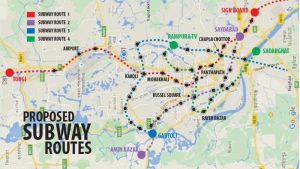
The Metro Rail (Uttara-Motijheel, MRT Line-6) has been launched in Dhaka. Two more are in progress. There are three metro line projects in the pipeline. Dhaka Mass Transit Company Limited (DMTCL), an organization under the Ministry of Road Transport and Bridges, is responsible for their implementation. Bangladesh Bridge Authority (BBA), a body under the same ministry, has separately conducted a survey for the construction of metro rail’s homogenous communication infrastructure subway. The survey conducted in 2021 has cost about Tk 318 crore. The project is to be implemented in three phases between 2021 and 2050. Among these, there are plans to build 109 km of subway between 2021 and 2029. As per that plan, 185 and 257 km of the subway will be constructed in the second and third phases respectively. In all, the cost will be more than Tk 8.71 lakh crores.
The project was presented at the Board of Directors meeting held in May 2022 at the BBA office. However, Road Transport and Bridges Minister Obaidul Quader instructed to adopt a “go slow” policy in this regard.
“Dhaka subway project has not been canceled or suspended,” claims BBA Chief Engineer Kazi Md. Ferdaus, saying that “we are looking for investors to build the subway in Dhaka. We have also started discussions for implementation of four lines initially through public-private partnership (PPP).”
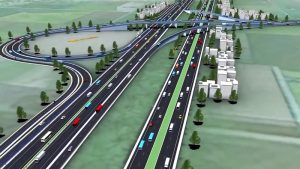
He also said that “many confuse metro rail with subway”, where metro rail service does not reach Dhaka, the subway will be built there. The project is important in decongesting Dhaka and the bridge authority is working on its implementation.
Bangladesh Railways has undertaken the project “Feasibility Study and Detailed Design for Construction of Dhaka-Chattogram via Cumilla/Laksam High-Speed Railway” to construct a high-speed train from Dhaka to Chattogram. With this, a feasibility study of the railway was done in 2017 with a cost of Tk 110 crore.
The study estimates the potential construction cost of the high-speed railway at $1,400 crore. During the discussion about the project, at the beginning of 2022, the then Railway Minister Nurul Islam Sujon said that it would not be implemented for the time being. As for the reason, he said that some short and medium-term work needs to be completed before starting the project. High-speed railways will be built only after they are completed.
In 2013, the RHD conducted a feasibility study of a project named Dhaka-Chattogram Elevated Expressway to improve the communication system of the commercial city of Chattogram with the capital Dhaka with a cost of around Tk 98 crore. It was canceled in 2021 after a long debate over the financing of the project.
Bangladesh Railway plans to build an 81-km circular railway network around Dhaka. The main objective is to increase the share of trains as public transport in the capital and play a role in reducing traffic tails. About Tk 30 crore has been spent on the feasibility study for the construction of the circular railway. According to the study, the cost of constructing the railway is estimated to be around Tk 97,000 crores to build the major part of the railway and some parts of the subway. The circular railway construction project is also in the same state.
Mentioning that implementation of the survey project outside of the master plan is a major “procedural mistake”, Prof. Dr. Hadiuzzaman said that conducting a large-scale feasibility study at the beginning was another wrong step. In this case, the agency could have reduced the wastage of money by doing a pre-survey instead of a full survey. Pre-surveys are conducted on a small scale. It also costs less.
He added that the agency in charge of implementing development projects should conduct surveys as per the master plan. Above all, we policymakers need to be more tactful before such surveys. Our country is small. The population here is highly dense. So there are resource limitations.
This professor said that the waste of limited resources cannot be a good example. (Source: Daily-Bangladesh)






